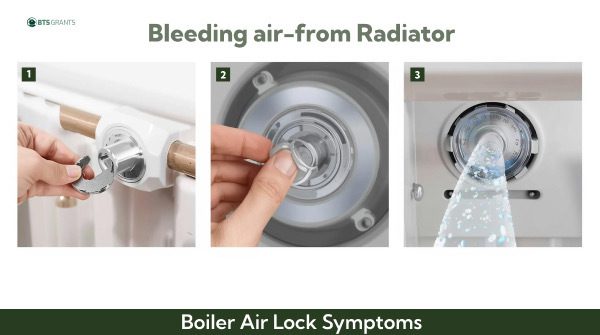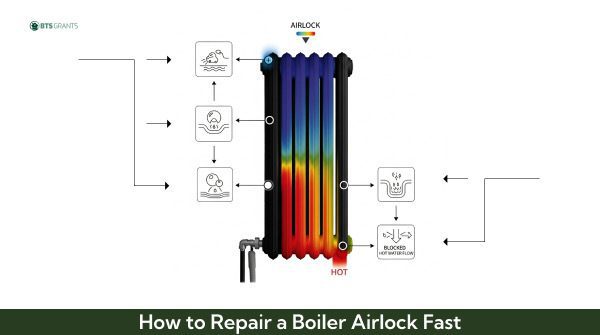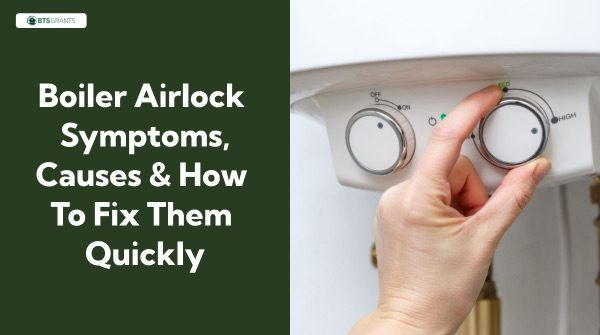If your home suddenly got colder than it has been or your taps only give lukewarm water, you might face a boiler airlock. This is a common issue that may occur with both central heating and hot water systems. An airlock in boiler pipes prevents water from freely flowing, leading to airlocked radiators, odd gurgling noises, or even the boiler not firing up for heating.
The good news? An air lock in the heating system is usually easy to identify and, in many cases, can be fixed at home without expensive repairs. This guide will cover boiler air lock symptoms, what causes them, and practical steps on how to clear air lock in boiler systems quickly and safely. This blog will detail boiler air lock symptoms, why they occur, and a working guide on how to clear a boiler air lock fast and securely.
What Is a Boiler Airlock?
A boiler airlock occurs when air becomes stuck in your hot water or central heating system. Since water and air don’t combine, trapped air keeps water from passing freely through your pipes and radiators.
Think of it as a road blockage in your radiator: water can’t move beyond the trapped air bubble, your radiator doesn’t heat up, and your hot water taps go cold.
An air lock in a radiator is common after draining or refilling the system, while an airlock in a hot water system can happen if water tanks or pipes haven’t been bled correctly. Left untreated, an air in boiler system problem can reduce efficiency and put unnecessary strain on your heating.
Boiler Air Lock Symptoms


Wondering if your system is suffering from an airlock? Here are the most common boiler airlock symptoms:
- Cold or partially heated radiators – If you’ve got airlocked radiators, the tops may stay cold while the bottoms are warm.
- No hot water – A clear sign of an airlock in the hot water system is when your taps refuse to run hot.
- Unusual sounds – Bubbling or gurgling noises indicate air in the central heating pipes.
- The boiler will not come on for heat – Air trapped inside may disrupt the free flow of water, such that the boiler fails to kick in
- Low pressure readings – Sometimes, air causes an issue that looks like no pressure in the boiler, though it’s often trapped air.
If these symptoms sound familiar, it’s time to look into bleeding a boiler or your radiators to release the trapped air.
The Difference Between Boiler Airlock and Other Heating Problems
It’s easy to confuse an air lock in a heating system with other boiler issues. For instance, if there’s no pressure in the boiler, that typically indicates a leak or a malfunctioning pressure relief valve rather than an airlock. Likewise, a boiler not firing up for heating might be due to a thermostat malfunction, pump breakdown, or even an obstructed flue. The sole exception is that airlocked pipes or radiators make gurgling noises and a wobbling, unbalanced heat, a classic sign of trapped air rather than something mechanical.
What Makes a Boiler Airlock?
Airlocks don’t suddenly occur. Some of the most frequent reasons for an airlocked boiler or radiator air lock are:
- Draining and refilling the system – When maintenance has been done, air pockets can become trapped.
- Leaks – Tiny leaks allow air into the system, causing repeated air in the heating system problems.
- Poor maintenance – Failing to service annually can lead to air accumulating in pipes and tanks.
- Faulty valves or pumps – If you have a seized bleeding valve or a dirty pump, air won’t be able to escape.
In extreme situations, the faulty boiler interlock arrangement will also lead to circulation, which might feel the same as an airlock issue.
Boiler Brands & Airlock Troubleshooting
Boilers deal with airlocks slightly differently. For example, combi boilers are likely to have air in the central heating system after refilling. In contrast, conventional system boilers with water tanks can suffer from an airlock in the hot water system in case of improper refilling. Most brands, like Grant, offer a Grant boiler troubleshooting guide to assist customers in bleeding radiators, pumps, and fixing circulation problems. Always consult your boiler’s handbook for brand-specific information before trying DIY repairs.
How to Repair a Boiler Airlock Fast


Here is the part you were waiting for—how to fix the problem. You can try a few DIY fixes before hiring an engineer.
1. Bleeding Radiators
The simplest way to remove trapped air is by learning how to bleed the radiator.
- Turn off the heating and let the system cool.
- Turn the bleeding valve with a radiator key at the top of the radiator.
- Release the trapped air until water starts flowing normally.
- Tighten the valve and inspect for leaks.
If you have a seized radiator bleeding valve, use WD-40 or call a professional.
This method usually fixes airlock in radiator issues and keeps your heating system running efficiently.
2. Bleeding a Boiler
Sometimes you will have to extend beyond the radiators. Bleeding a boiler directly allows trapped air in the system to escape. Always follow your manufacturer’s instructions (for example, the Grant boiler troubleshooting manual provides clear steps for their models).
This is particularly useful when you’re facing persistent air in boiler system issues or repeated air lock in heating system problems.
3. Central Heating Pump Bleed
Sometimes the air gets stuck in your pump. Knowing how to bleed a central heating pump is essential:
- Locate the pump bleed screw.
- Slowly release it with a screwdriver until air escapes.
- Once the water is running, close it up again tightly.
This step helps if you’ve got air in the central heating system or circulation issues preventing radiators from heating evenly.
4. Hosepipe Method for Pipes
If you need information on how to remove airlocks from pipes, the hosepipe method works perfectly.
- Set up a hosepipe between a functioning tap and the affected tap by the air lock in the hot water system.
- Both taps should be opened, with mains water pressure forcing out trapped air.
- Run for a few minutes before turning it off.
This method is particularly useful for airlock in boiler hot water supplies.
5. Water Tank Airlock Removal
For homes with a water tank, here’s how to remove air lock from water tank:
- Turn off the mains.
- Open the taps and allow the system to drain a little.
- Slowly fill, allowing air bubbles to escape in the process.
This action avoids repeated airlocks in the hot water system connected to the tank.
Safety Precautions when Bleeding a Boiler
Although bleeding a boiler or radiators is usually easy, safety must be the priority. Always allow the system to cool first before handling valves to prevent burns. Be careful with a seized radiator bleeding valve—forcing it can cause leaks. If you’re unsure, it’s best to call a professional heating engineer. Over-bleeding can also lead to no pressure in the boiler, which may stop it from working altogether.
How to Avoid Boiler Airlocks in the Future
Dealing with an airlocked boiler one time is infuriating, but avoiding it is even better. Thus:
- Routine service – Annual servicing minimizes the likelihood of air problems in the central heating system.
- Bleed radiators seasonally – Make bleeding radiators an occasional task, perhaps before winter.
- Test for leaks – Get small leaks repaired before they introduce additional air.
- Refill systems carefully – When topping up after repairs, go slowly to prevent air in the heating system issues.
Energy Efficiency & Cost Angle
An airlocked boiler doesn’t just reduce comfort—it also increases energy bills. When radiators are only partially heating because there is air in the boiler system, the boiler has to work harder and burn more fuel to attempt to make up for it. This reduces your heating efficiency and can lead to a shorter lifespan of the system. Draining airlocks efficiently enhances energy efficiency, makes your home warmer, and can even save you money on repairs and fuel bills.
When to Call a Professional Heating Engineer
While DIY fixes often solve the issue, there are times when calling in help is the smarter move:
- You’ve tried multiple methods and the airlock in the boiler returns.
- Your central heating pump bleed doesn’t solve circulation issues.
- You can’t loosen a seized radiator bleeding valve.
- The boiler shows persistent faults beyond trapped air, such as constant ‘no-pressure in boiler’ errors. The boiler has recurring faults other than trapped air, including recurring no-pressure in the boiler.
Professional engineers have the tools and knowledge to identify whether it’s really an airlock in the heating system or a deeper fault. If your boiler is old and regularly experiences airlocks or breakdowns, replacement might be something worth looking into. You can even be in a position to get a government grant under initiatives like the ECO4. For instance, most homes in the UK can apply for boiler replacement grants or central heating grants to update their system with little to no expense.
FAQ’S
It tends to make a gurgling, bubbling, or knocking noise in the pipes—typical indications of air in the boiler system.
Yes, an air lock within the hot water system can completely shut off the flow, and you will have no hot water.
Using the radiator or hosepipe method, most air lock issues can be cleared in under an hour.
Not always. Many homeowners successfully learn how to clear air lock in boiler systems using the methods above. But if the problem keeps coming back, professional help is best.
No, a boiler interlock is a control system for efficiency. An air lock is trapped air preventing water flow.




